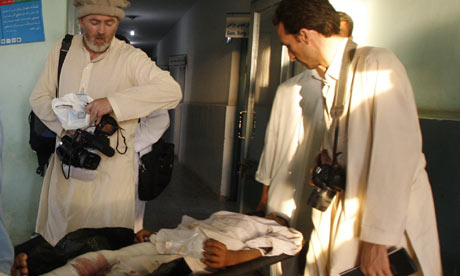Deaths of translator and soldier continue to raise questions about whether all avenues of negotiation had been properly explored

Stephen Farrell, wearing a hat, and Sultan Munadi earlier this month. Munadi was killed following a special forces raid. Photograph: Omar Sobhani/Reuters
Fears that the Taliban was about to move the British hostage Stephen Farrell across the border into Pakistan may have prompted yesterday's controversial commando raid in which his translator and a soldier were killed.
As Downing Street confirmed today that Gordon Brown was given updates about the pre-dawn assault, Farrell, a New York Times correspondent, said his captors had become increasingly menacing and appeared to be preparing to move him to a neighbouring district.
A senior Afghan official, quoted by the paper, said the ultimate destination was Pakistan.
A British official yesterday told the Guardian the journalists' lives were in imminent danger. "An opportunity arose and it was seized," he said.
A spokesman for the prime minister added that the decision to rescue Farrell was made by David Miliband, the foreign secretary, and Bob Ainsworth, the defence secretary, and that Brown was kept "in the loop" over developments.
But criticism of the raid mounted today amid suggestions that a negotiated settlement might still have been possible.
Some military officers have rebuked the reporter for going to such a volatile area and putting his rescuers' lives at risk.
Meanwhile, a group of Afghan journalists blamed Nato for the death of the translator, Sultan Munadi, and criticised international troops for not retrieving his body.
They said the rescue mission had been launched without exhausting other options. The Red Cross had been negotiating with Mullah Salam, the Taliban "shadow governor" of Kunduz province, and believed a deal was close.
One western official said: "He was out of money and open to doing a deal. The plan was to keep negotiations local and appeal to the decency of Afghans to do the right thing and release a civilian journalist.
"But then MI6 charged in and, with next to zero knowledge of the local situation, decided to launch an operation."
But a senior Afghan official insisted there was little choice: the Quetta shura, which Nato believes directs the Taliban from the western province of Baluchistan, had given an order that the men should be brought to Pakistan.
Farrell and Munadi travelled to the northern city of Kunduz on Friday to investigate reports that US warplanes had dropped two bombs on a convoy of hijacked oil tankers, killing at least 70 people.
They were kidnapped the following morning as they interviewed villagers on a riverbank near the burned out tankers.
Munadi fell in a hail of gunfire as he led Farrell out of the Taliban-held compound as British forces stormed in. "He was trying to protect me up to the last minute," Farrell wrote.
Brown hailed the helicopter assault, carried out by the Parachute Regiment and the Royal Marines, as an act of "breathtaking heroism" and said the bravery of the soldier who died would not be forgotten.
But military insiders have questioned why Farrell ignored police advice about the hazardous security in the area, where anger against the west was running high because of the civilian deaths in the Nato strike.
One army source was particularly scathing, telling the Telegraph: "When you look at the number of warnings this person had, it makes you really wonder whether he was worth rescuing, whether it was worth the cost of a soldier's life.
"In the future, special forces might think twice in a similar situation."
Police had warned the pair that the area was crawling with Taliban. But on his blog in the New York Times, Farrell defended his decision.
He wrote: "The drivers made a few phone calls and said the road north appeared to be safe until mid to late afternoon. It was close to the cutoff point, but if we left immediately we could do it. We left within minutes."
Farrell admitted they lingered at the site, shooting video and interviewing witnesses for an "uncomfortably long" period.
"I am comfortable with the decision to go to the riverbank, but fear we spent too long there," he said.
As armed Taliban fighters approached from across the river, he said, local villagers scattered in panic. But the men could not move because their driver had disappeared with the vehicle keys, and they were caught.
There has been sharp criticism from Munadi's home area in the Panjshir Valley.
Panjshiris hold influential positions in the security services, and some officials have threatened to declare Farrell, currently staying at the British embassy, persona non grata, effectively banning him from Afghanistan.
Source
